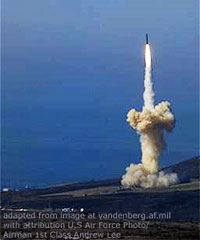Can Putin and Obama Make a Deal on Missile Defense?
Vladimir Frolov, Vladimir Belaeff, Dale Herspring, Dick Krickus, Edward Lozansky, Vlad Sobell -
Russia Profile Weekly Experts Panel - russiaprofile.org - 3.30.12 - JRL 2012-60
Speaking at the Euro-Atlantic Security Conference in Moscow last Friday, outgoing President Dmitry Medvedev said Russia and NATO could still reach an agreement on missile defense, but time is running out and opportunities for compromise are becoming fewer as the U.S. missile defense plans near implementation. Can Putin and Obama make a deal on missile defense? Would Obama go for a written statement of guarantees sought by Russia? Would Putin accept this as a compromise?

file photo"The door is not closed for talks on missile defense," Medvedev said at a Euro-Atlantic Security forum in Moscow. "We still have time, but it is running out."
The defense system must correspond with the goal of its creation: it should counter possible missile threats coming from outside Europe, the Russian leader stressed. However, "no one has explained so far to me why we should believe that the new European defense system is not aimed against us," Medvedev said. "They keep telling us: 'this system is for you,' but how should we use it?"
Talks between Russia and NATO on the U.S.-led missile defense have deadlocked over U.S. reluctance to give Moscow legally ¬binding guarantees that the missile defense system will not be used against Russia. The United States says the system is designed to protect against "rogue states" such as Iran and North Korea, but Russia is concerned it could eventually be used to neutralize its own nuclear deterrent.
Medvedev said that Russia needs reliable guarantees that the system would not be aimed against its strategic nuclear forces. Such guarantees cannot not be made in a "casual conversation over a glass of wine," Medvedev said, but "should be put down on paper."
Medvedev's statements on missile defense come a day after Russia and NATO decided to postpone their summit, scheduled for May in Chicago, for lack of progress on the central issue dividing them missile defense. Earlier, U.S. President Barack Obama decided to change the venue for the G8 summit, moving it from Chicago to Camp David so as not to inconvenience Russia's incoming president Vladimir Putin.
Yet, despite the overdose of anti-American vitriol during his presidential campaign in Russia, Vladimir Putin may be better positioned to make a deal with Obama on missile defense then his predecessor president Medvedev. For Obama, the upside of having to deal with Putin in the Kremlin is that Putin can afford to accept what Medvedev could not dare. This may come in handy in May, when Putin and Obama discuss missile defense at Camp David.
The contours of a possible compromise deal are fairly obvious. Putin may accept Obama's written statement that the planned U.S. missile defense in Europe will not be targeted against Russia's strategic nukes, accompanied by U.S. assurances that the burn-out velocity of U.S. interceptors will not allow for a boost-phase intercept of Russian missiles. Obama may embrace Putin's new proposals for data sharing and joint threat assessment arrangements that build upon Putin's 2007 offer to George Bush at